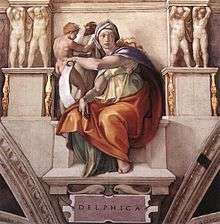Definify.com
Webster 1913 Edition
Sibyl
Sib′yl
,Noun.
[L.
sibylla
, Gr. [GREEK][GREEK][GREEK][GREEK].] 1.
(Class. Antiq.)
A woman supposed to be endowed with a spirit of prophecy.
☞ The number of the sibyls is variously stated by different authors; but the opinion of Varro, that there were ten, is generally adopted. They dwelt in various parts of Persia, Greece, and Italy.
2.
A female fortune teller; a pythoness; a prophetess.
“An old highland sibyl.” Sir W. Scott.
Webster 1828 Edition
Sibyl
SIB'YL
,Noun.
Definition 2026
Sibyl
Sibyl
See also: sibyl
English
Alternative forms
Proper noun
Sibyl
- A female given name.
- 1594, William Shakespeare, The Taming of the Shrew, Act I, Scene II:
- Be she as foul as Florentius' love, / As old as Sibyl, and as curst and shrewd / As Socrates' Xanthippe, or worse, / She moves me not.
- 1594, William Shakespeare, The Taming of the Shrew, Act I, Scene II:
- Alternative letter-case form of sibyl
Usage notes
- Used as a name since the Middle Ages. Since the 19th century usually spelled Sybil.
Translations
female given name
Anagrams
sibyl
sibyl
See also: Sibyl
English

Michelangelo's rendering of the Delphic sibyl
Noun
sibyl (plural sibyls)
- A pagan female oracle or prophetess, especially the Cumaean sibyl.
- 1603, William Shakespeare, The Tragedy of Othello: Act III, Scene IV:
- A sibyl, that had number'd in the world
- The sun to course two hundred compasses,
- In her prophetic fury sew'd the work;
- 1922 T. S. Eliot, The Wasteland: Epigraph (translated from 61 Petronius' The Satyricon: Chapter 8, Lines 80 -86)
- I used to read these tales in Homer when I was a lad. Then the Sibyl! I saw her at Cumae with my own eyes hanging in a jar; and when the boys cried to her, ‘Sibyl, what would you?' she'd answer, ‘I would die,'-- both of ‘em speaking Greek."
- 1603, William Shakespeare, The Tragedy of Othello: Act III, Scene IV:
Translations
a pagan female oracle